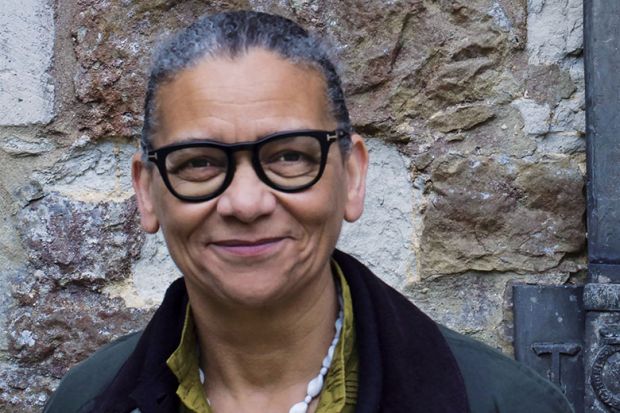Lubaina Himid is an artist and curator. She makes paintings, prints, drawings and installations that celebrate the people of the African diaspora and challenge their historical representations. She won the Turner Prize in 2017, becoming the oldest artist and the first black woman to win the award, and was appointed Commander of the Order of the British Empire (CBE) in 2018 for her services to art. She is professor of contemporary art at the University of Central Lancashire.
Where and when were you born?
I was born in Zanzibar, Tanzania in east Africa in 1954, and lived there for four months before I left to come to Britain.
How has this shaped you?
Growing up in Britain has had a far bigger influence on who I am today. My aunt was a schoolteacher and taught me to read at the age of four – having that skill so young made a huge difference to my early life. At school in London, I quickly learned that I was thought of as being different.
What kind of undergraduate were you?
I was a struggling undergraduate doing theatre design, a course I felt unsuited for. I worked as hard as I could, because I was passionate about what theatre could achieve politically, but was miserable most of the time. I knew it was impossible to develop a career in the theatre because my tutors made it consistently clear to me that I would be useless.
Your art focuses on themes of cultural history and reclaiming identities. Why are you drawn to that subject?
I’m drawn to the theme of cultural history because the real history of how black people contribute to and have consistently been part of the huge and rich cultural landscape globally has not yet been fully revealed and acknowledged. I see it as imperative to tell the stories of our everyday lives, as well as being a part of a set of creative people who are dedicated to spending their lives uncovering the hidden narratives of how we have found ourselves in this precarious place.
You were one of the first artists involved in the UK’s Black Art movement in the 1980s. What was that experience like?
Being part of the Black Art movement was always quite challenging. I was writing about it as part of my MA at the Royal College of Art while also working as an artist in makeshift spaces and trying to survive on very little money as a community play leader in south London. Meeting and talking to members of the BLK Art Group, Black Audio Film Collective and Sankofa was incredible, though. I came to know many artists of colour, and quickly understood that I was interested in promoting and encouraging conversations between women to see whether we could develop a more inclusive dialogue between art and audience.
Has winning the Turner Prize changed your life or your art?
My art projects, and the themes contextualising my work, instantly reached a global audience. I am now taken more seriously by a number of hitherto indifferent members of the industry. The prize and the publicity surrounding it also allowed me to make a difference to the working lives of some artists I like to collaborate with. As well as this, my own practice is even more experimental and is, of course, better funded.
What advice do you give to your students?
They should try to savour every minute of their time in higher education since it’s the people and the new experiences that will make a difference to them later in life. They should also try to squeeze as much information about their chosen subject out of their tutors at every opportunity. Learning to listen is useful, and having a true grasp of the fact that they are only at the beginning of something is probably wise.
What keeps you awake at night?
I am kept awake at night by knowing that I live in a world where women still have very little agency despite our incredible contributions. We constantly have to prove, time after time, that we are equal to men, and I’m not entirely convinced that anyone is really listening to us.
If you were the universities minister for a day, what policy would you immediately introduce to the sector?
I’d take another look at the divisive policies around fees and loans and move towards a civilised system that’s more accessible, inclusive and properly funded. This would be supported by grants so that students can focus on learning and truly make the most of being in an academic environment.
What one thing would improve your working week?
If I could, I would change the size, capacity and structure of my week by rejigging things for myself so that my month consisted of three 10-day weeks made up of eight working days and two weekend days. No one else would have to adhere to this system, but it would help me immensely. Of course, it might be easier to paint faster.
Tell us about someone you admire.
Having the nerve to be seen to change things for the better for women in a strategic yet caring way is an important element of any woman’s life or work plan, and I’m impressed by the way that curators Helen Legg, director of Tate Liverpool, Frances Morris, director of Tate Modern, and Maria Balshaw, director of the Tate art museums and galleries, are doing that by making a massive difference in the world of art and art history. However, if I had to choose one person, it would be Griselda Pollock at the University of Leeds, who has always been at the forefront of the drive to make the world a better place.
What would you like to be remembered for?
I’d like to be remembered for having made a useful contribution to conversations about how powerful visual art can be.
ellie.bothwell@timeshighereducation.com
Appointments
Shirley Congdon has been named the next vice-chancellor of the University of Bradford. Professor Congdon, who is currently the university’s deputy vice-chancellor (academic), will be the first woman to lead Bradford when she takes over from Brian Cantor in the summer. Professor Congdon, who joined Bradford as dean of health studies in 2009, said that she was “looking forward to leading our talented staff and students to increase our impact”. “Despite operating in an increasingly challenging environment,” she continued, “I am confident that the University of Bradford will increase its impact locally and globally.”
Joyce McConnell has been selected as Colorado State University’s first female president, pending approval from the university’s governing board. Professor McConnell, who is set to replace Tony Frank, currently serves as provost and vice-president for academic affairs at West Virginia University, where she has led efforts to advance gender equity and promote diversity and inclusion, Colorado State officials said. “Joyce McConnell has an extraordinary track record in higher education leadership and a deep appreciation for Colorado State University’s mission and character,” said Rico Munn, chair of the CSU system board of governors, who added that she had shown “a unique ability to lead with vision while bringing diverse groups alongside in a common drive for excellence”.
Sylvia Walby has been appointed director of City, University of London’s new interdisciplinary research centre on violence and society. Professor Walby joins City from Lancaster University, where she was professor of sociology, Unesco chair in gender research and director of the Violence and Society Unesco Centre.
Henrietta O’Connor has been named pro vice-chancellor at the University of Leicester. The sociology professor will also be head of Leicester’s College of Social Sciences after leading the school on an interim basis.
Register to continue
Why register?
- Registration is free and only takes a moment
- Once registered, you can read 3 articles a month
- Sign up for our newsletter
Subscribe
Or subscribe for unlimited access to:
- Unlimited access to news, views, insights & reviews
- Digital editions
- Digital access to THE’s university and college rankings analysis
Already registered or a current subscriber? Login








